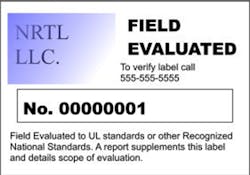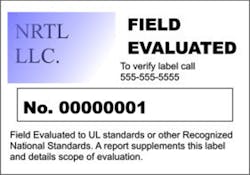What is a Field Evaluation Body, and What Do They Do?
A couple of new definitions have been added to the 2017 Edition of the National Electrical Code (NEC). Article 100 now defines a Field Evaluation Body (FEB) and the term Field Labeled.
A Field Evaluation Body (FEB) is “an organization or part of an organization that performs field evaluations of electrical or other equipment.”
Field Labeled (as applied to evaluated products) is defined as: “Equipment or materials to which has been attached a label, symbol, or other identifying mark of an FEB indicating the equipment or materials were evaluated and found to comply with requirements as described in an accompanying field evaluation report.”
These definitions were extracted from NFPA 790 “Standard for Competency of Third Party Field Evaluation Bodies.” This document sets the criteria for qualifications of the company and individuals who perform field evaluations of electrical products and equipment.
When you find yourself with a questionable piece of uncertified or unlisted equipment, many headaches can be resolved by having the equipment inspected and Field Labeled by an FEB. Most, if not all, National Recognized Testing Laboratories (NRTLs) in the U.S. provide this service. It needs to be noted that while a NRTL may provide this additional service, OSHA doesn’t accredit any entity to perform Field Evaluations. And, many NRTLs are only recognized by OSHA for limited standards for product certification in their laboratories. Being an NRTL does not automatically make the FEB acceptable to the Authority Having Jurisdiction (AHJ). Be certain any FEB you contact has the competency to properly complete the field evaluation and that they will be acceptable to the AHJ.
Let’s take a look at a typical scenario for getting a piece of equipment Field Labeled.
A client orders a piece of uncertified equipment and you’re the electrical contractor installing and commissioning it in an industrial facility here in the United States. It’s a one of a kind bagging machine on a skid and is quite large and complicated. For this example, the manufacturer is located in Germany. The electrical inspector comes out, looks at it and sees some questionable items on it. The biggest issue is all of the wiring is done with open cable instead of conduit. In addition, the wiring along with many other components, do not have any certification or recognition to U.S. standards as evidenced by appropriate marks. Rewiring the entire machine would be very expensive, and the open cable looks like it is done in a workmanlike manner and appears to be safe, other than not meeting U.S. codes.
This is the perfect opportunity to possibly save your client some money. And, if nothing else, will provide direction on what needs to be brought up to American codes and standards. You advise calling in a qualified FEB. The FEB will provide an appropriate engineer to evaluate the safety of the equipment for a fee. Many times the expense is much less than what it would cost to rebuild the equipment.
The FEB comes out, makes recommendations, returns after the modifications are performed, and labels it with his organization’s seal of approval. This satisfies the local inspector and the equipment is put into service.
If done early enough in the process, the FEB can complete this initial evaluation at the factory before the equipment is shipped allowing the manufacturer to re-engineer and make appropriate corrections so the final evaluation at the final installation site can be quickly completed.
The situation above is just one instance where an FEB may be employed. Field evaluations are used regularly for custom-made equipment, such as one of a kind industrial control panels, signs, motor control centers, and switchgear. While the terminology is new to the NEC, this is a practice that has been around for decades.
It’s important to note that while NRTLs were used in this example, the NEC doesn’t require the FEB to be an NRTL. But beware that OSHA may require it.
© 2016 Fluor Corporation. All Rights Reserved.
About the Author
Eddie Guidry
Senior Fellow
Eddie Guidry is a senior fellow with Fluor Enterprises, Inc., Sugar Land, Texas. He is highly skilled in electrical and control systems for industrial construction, design, and engineering (both domestic and abroad). The majority of Eddie’s 38 years of experience includes upstream and downstream portions of petrochemical plants and refineries. He is also heavily experienced in water and wastewater treatment facilities. Eddie is very active in the development of U.S. national (ANSI) and international codes and standards, and has been a principal member of the National Fire Protection Association (NFPA) National Electrical Code (NEC) committee since 1999 and NFPA’s National Advisory Committee on Electrical Safety Research since 2008. Eddie, who has also developed and conducted many electrical courses and seminars over the years, currently holds the corporate Master Electrician license for Fluor Corporation in the State of Texas and is also an ICC/IAEI certified electrical inspector.

